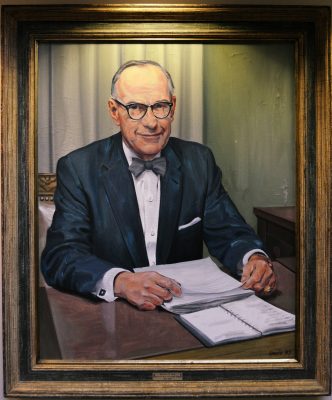Choosing a president
The selection of Jonathan Brand, who will become Cornell’s 15th president on July 1, was led by a committee of eight trustees and five faculty members working with a national search firm. Brand’s predecessor, Les Garner, took office in 1994 after he and two other candidates spoke publicly on campus. For most of Cornell’s history, however, presidential selection wasn’t quite so transparent or without controversy.
Until anti-discrimination laws mandated that vacancies be advertised nationally, trustee presidential selection committees went unchallenged in considering only candidates who were male Methodists and preferably preachers. Of the first nine presidents, only two were laymen. The faculty was excluded from the process until 1943, when the board allowed the faculty to elect one of their own to the committee.

Despite the inclusion of a faculty member on that committee, the perception by some in the community that alumnus Russell Cole’s election had been contrived persisted throughout the 27 years of his presidency. His father, the Rev. Frank Cole, had been a trustee since 1912, president of the board since 1926, and vice president and financial secretary of the college since 1927. No Cornellian before or since has wielded such power.
Russell, after graduating in 1922 with an economics major and working for a mortgage company, decided to become a minister. He earned degrees from Boston University’s School of Theology and achieved success in several pastorates and as a fundraiser for the university. When Frank fell ill in 1939, he recalled a reluctant but obedient Russell from New England to succeed him, at first in name only, as vice president and financial secretary. After President Magee died in April 1943, the trustee selection committee undertook the usual search. On the morning of the board’s fall meeting, everyone assumed the committee’s business would be to vote on the several candidates to be invited for interviews. Instead, the committee unanimously nominated Russell. Within hours the executive committee and then the full board unanimously elected Russell Cole the college’s ninth president. Such haste and the fact that the board’s published agenda did not mention a presidential election, gave rise to charges of nepotism.
Although Arland F. Christ-Janer, who succeeded Cole in 1961, held a bachelor of divinity from Yale and juris doctor from the University of Chicago, his candidacy was bitterly opposed by the Methodist Bishop of Iowa, F. Gerald Ensley, a member of Cornell’s board of trustees, because Christ-Janer was neither a Methodist—he had been raised a Lutheran (Missouri Synod)—nor a minister. The bishop confided his views to a reporter from a Cedar Rapids radio and television station, which broadcast his threats that the Methodist church might withdraw its financial support and sever its relationship with the college.
One of Christ-Janer’s first acts after assuming office was to appoint a Methodist minister as assistant to the president for church relations and another Methodist clergyman as campus minister (now chaplain).
